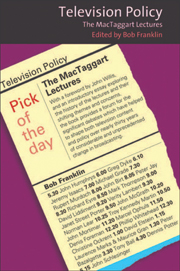Book contents
- Frontmatter
- Contents
- Acknowledgements
- Foreword
- Introduction
- The James MacTaggart Lectures
- Appendix A Edinburgh International Television Festival, 29 August–2 September 1977: Programme
- Appendix B Précis of Ted Turner, James MacTaggart Lecture 1982; Dr Jonathan Miller, James MacTaggart Lecture 1983
- Index
Appendix B - Précis of Ted Turner, James MacTaggart Lecture 1982; Dr Jonathan Miller, James MacTaggart Lecture 1983
Published online by Cambridge University Press: 05 August 2013
- Frontmatter
- Contents
- Acknowledgements
- Foreword
- Introduction
- The James MacTaggart Lectures
- Appendix A Edinburgh International Television Festival, 29 August–2 September 1977: Programme
- Appendix B Précis of Ted Turner, James MacTaggart Lecture 1982; Dr Jonathan Miller, James MacTaggart Lecture 1983
- Index
Summary
The publishers were unable to secure the authors’ permission to reproduce two of the MacTaggart Lectures. The first was given by Ted Turner (1982), the second by Dr Jonathan Miller (1983). A brief précis of the key concerns of each lecture is given below.
Ted Turner, James MacTaggart Lecture 1982
Ted Turner, founder and president of Cable News Network (CNN), delivered the James MacTaggart Memorial Lecture in 1982. It set a precedent by being the first ‘ad-libbed’ lecture: no lecturer has subsequently followed Turner's lead. Turner's approach was broadly anecdotal; his modest ambition, to ‘tell you a little about my experiences in this business’.
Turner's first business involvement was with what Americans call the (outdoor) advertising industry. In the UK, this is known as hoardings and billboards which impose a ‘blight on the scenery’, but they constitute ‘a good profitable business’ which funded the purchase of Turner's television station. He bought the station because he liked old films and because it was cheap: ‘I couldn't afford a real television station so I bought this Mickey Mouse station’ in 1970. Turner knew very little about television and had no love for the medium. He was not part of a network and described himself as a ‘fringe, fringe player’. But he argued that success in television rests on skills in programming and promotion alongside an ability to anticipate future trends in communications. Two technological developments were crucial.
- Type
- Chapter
- Information
- Television PolicyThe MacTaggart Lectures, pp. 279 - 282Publisher: Edinburgh University PressPrint publication year: 2005



